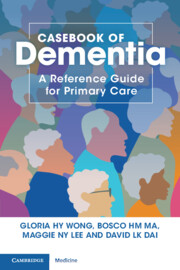This book is a collective effort over two decades in Hong Kong, of many dedicated primary care professionals and families of people living with dementia who trusted us with their care.
The early detection service described in this book – the contact point where we get connected with the 99 help-seeking families presented here – started as a small-scale service of the Hong Kong Alzheimer’s Disease Association (HKADA) in 2006, which has since served thousands of people against a context of poor access to diagnostic services. The HKADA is a non-profit-making self-financed charitable organisation and the only member of Alzheimer’s Disease International in Hong Kong, with a humble origin in the form of a self-help group established in 1995. With the generous support from the Lee Hysan Foundation, we piloted a shared primary care model in 2016 (‘Project Sunrise’), which was built on the existing early detection service to form partnerships between allied health and social care professionals with primary care physicians.
This pilot model proved to be a rich source of inspiration and experiences. In Hong Kong, primary care physicians are mostly in private practice, who are not short of patient demand for their care with regular clinic services. This is why it is particularly encouraging to see many enthusiastic primary care physicians joining the pilot, spending many extra hours in training, consultations, case conferences, and communication with the allied care team. The social workers, occupational therapists, and primary care physicians who have participated in the pilot contributed to this book in multiple ways: they have showed us that the model is feasible, that the shared care helped to develop confidence in dementia care and treatment, and most importantly, why a reference guidebook like this is needed.
We learned from Project Sunrise that, in a busy primary care practice, clinic, or centres, staff training is at the same time an acute need and burden. While in-person, synchronised training sessions are valuable, reference materials for self-paced learning are just as important. We have also learned that clinical competences and confidence require time and experience to develop: over time, physicians and allied care professionals in the project managed to provide quality care for families impacted by Alzheimer’s disease and needed minimal specialist support only with a few cases with atypical presentations. A pedagogy with brief induction training with continuous (low-level) post-training specialist support, supplemented with easy-to-read self-learning materials in the format of cases and practical tools, appears to fit the learning needs of our primary care team. Such was the motivation for our compilation of this book, with real cases and learning points from the piloted model and HKADA’s 28 years of implementation experience.
Readers should be aware that all the cases presented here are from Hong Kong. While pseudonyms are used, we have decided to retain the use of Chinese surnames, although they may be less familiar to readers from other countries or regions. This serves as an attempt to remind ourselves of the importance of the cultural (and service) context in dementia care. Just as it is the case for learning materials developed in Western cultures, these backgrounds and contexts may or may not be directly applicable elsewhere (in our case, these may include family dynamics and public/private service configuration), although we trust that they are of reference value internationally when presented in context.
This is because the core of this book is people living with dementia and their families in real life. We have learned so much about dementia and care from the 99 families in Project Sunrise, who selflessly shared their help-seeking journey with us for education and research purposes. The brief descriptions of each case, so brief (with only essential information for clinical decision-making) that it feels brutal at times, did not do justice to all the complexities and nuances of the dementia experience in primary care. Even with such brutal treatment, each case presented here remains a great illustration of the clinical wisdom in dementia care and is worth a thousand (generalised, theoretical) words to many. We are truly thankful to all the people living with dementia and their families who made this book possible. We hope you enjoy learning from these families as much as we do.

